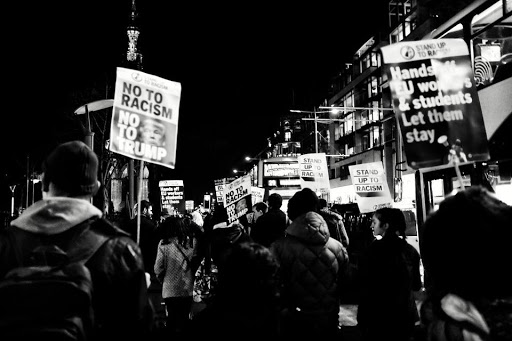Robin Mitzcavitch, Director of Religious Exploration & Education

When trying to identify what kind of Unitarian Universalist curricula to offer our children, we planned on using our traditional curriculum map and move the children in our program through Spirit Play (a montessori based program for pre-K and K), “Tapestry of Faith” which offers a wide assortment of wonderful curricula held by the UUA, and through OWL (Our Whole Lives- A Human Sexuality curriculum.)
When COVID hit and we had to morph into a non-traditional style of Sunday morning Religious Exploration, I went looking for a curriculum that better suited the times and the situation. I came to realize that we would have to work in a “one-room” classroom format for the fall over Zoom, and I set out over the summer to find the best fit.
I was alarmed, along with so many others, about the rising tide of systemic racial bias, inequity, and violence. My heart knew that our church and my program would be most helpful if we were the safe place to talk about these realities with families.
I found a curriculum written by educators at the Thomas Jefferson Memorial Church, Unitarian Universalist- located in Charlottesville, Virginia.
“Growing Anti-Racist UU’s- A Curriculum for Children” is a wonderful multi-aged work written by a team from the church. The team consists of Elaine Chapman, Linda Dukes, Ann Forno, Dinny Jensen, Katherine Parsons, and Camille Thompson, under the guidance of Leia Durland-Jones, their Director of Faith Development. The final work was edited by Greg C. Carrow- Boyd, MEd, CRE–ML, a Master Level Credentialed Religious Educator and Aspirant for Unitarian Universalist ministry. He serves on the Board of Trustees of our Unitarian Universalist Association (UUA).
Here is an excerpt from the introduction of their work:
In 2016, following the many events surrounding the brutal treatment and death of Black Americans including the murder of several African Americans within the sacred setting of a church, our religious education program felt compelled to provide our congregation’s children with appropriate lessons and experiences in racial justice. Furthermore, in 2017, our community of Charlottesville, Virginia witnessed its own difficult struggles in advocating for justice for black lives. Our search for a complete written curriculum, one which would combine racial justice with principles of Unitarian Universalism led us to write the curriculum.
So, just as TJMC-UU searched to present lessons appropriate to our times, our UU faith, a faith of justice, whose first principle says that we: Believe in the Inherent Worth and Dignity of Every Person…. so did I. I had the good fortune to come across this excellent and important work.
I have revamped and amended some portions of this curriculum to fit our age groups and audience.I am calling our time together on Sunday mornings “Raising Inclusive and Justice-Minded UU Children: Stories, Activities, and Discussions.” We have begun the year looking at the topic of race, getting comfortable identifying the fact that we are all different shades, and our skin is merely our covering, and not an indication of what type of person lies underneath. We also discussed the reality that although this is a good way to think- many of us have been raised within a system that has not been built on racial equality, and it’s really up to us to understand this and work towards awareness and change.
These conversations are not always easy and often not something that folks sit around the dinner table talking about. The truth is, it’s an enormous elephant in the room if ignored. As uncomfortable as I may be talking about racism, my comfort is not the issue. It is my responsibility as a white human, with knowledge about systemic racism, to share it as best I know how. As a Unitarian Universalist Religious Educator, I have many justice avenues I can travel down with children and youth. In my opinion, all hot topic justice scenarios can be backed up to the fact that this country was not built to serve all equally, and it continues to be that way.
We embark on a challenging year for all, but I hope to bring the topics of love, equality, empathy, vision, inclusivity, and justice to the forefront. We hope to teach it in uplifting and empowering ways. I am thrilled to be a part of growing more justice seekers and keepers for our world.
FOUR CORE GOALS OF ANTI-BIAS EDUCATION From Louise Derman-Sparks & Julie Olsen Edwards, 2010. Anti-Bias Education for Young Children & Ourselves.
1. Each child will demonstrate self-awareness, confidence, family pride, and positive social identities.
2. Each child will express comfort and joy with human diversity; accurate language for human differences; and deep, caring human connections.
3. Each child will increasingly recognize unfairness, have language to describe unfairness, and understand that unfairness hurts.
4. Each child will demonstrate empowerment and the skills to act, with others or alone, against prejudice and/or discrimination.
In Peace and Justice,
Robin Mitzcavitch
